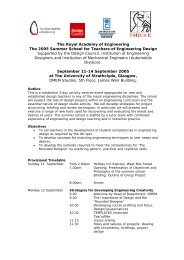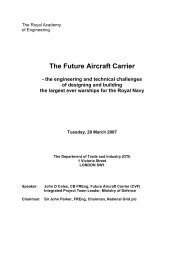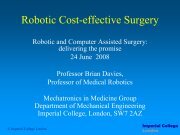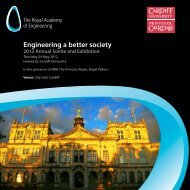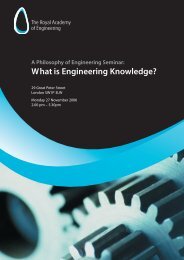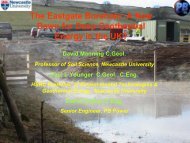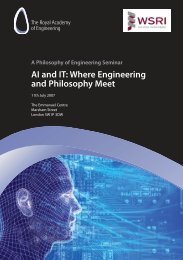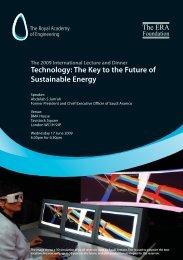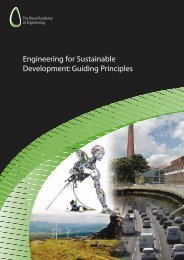Engineering graduates for industry - Royal Academy of Engineering
Engineering graduates for industry - Royal Academy of Engineering
Engineering graduates for industry - Royal Academy of Engineering
Create successful ePaper yourself
Turn your PDF publications into a flip-book with our unique Google optimized e-Paper software.
There are major redevelopments occurring in the immediate vicinity <strong>of</strong> LSBU that will be in the front line <strong>for</strong> the<br />
implementation <strong>of</strong> new energy strategies. For example, the South Bank Employers’ Group 68 has a project looking at how<br />
combined heat and power (CHP) systems could be put into all buildings from Blackfriars to Westminster and how this<br />
experience can be delivered to students. This involves more than technical skills and a Visiting Pr<strong>of</strong>essor in Employer<br />
Engagement is involved in developing leadership and management issues.<br />
Effective practice exemplar 10: understanding stakeholder needs at LSBU<br />
Direct interaction with employers<br />
Part-time UK students are attending LSBU because they and their employers find the courses are pertinent to their work.<br />
In return, the Faculty gains feedback from the students and their employers about what course content is appropriate<br />
and what technologies they are applying in their <strong>industry</strong>. The University is also able to influence employers through the<br />
technologies that their employees become familiar with while studying at LSBU.<br />
LSBU has the most KTP activity <strong>of</strong> any London university and is currently ranked third in the UK <strong>for</strong> the number <strong>of</strong> KTP<br />
programmes it runs 69 . Around 75% <strong>of</strong> this practical applied research is conducted within the Faculty <strong>of</strong> <strong>Engineering</strong>,<br />
Science and the Built Environment. The intercommunicating network <strong>of</strong> employers, their employees and academics<br />
provides a rich source <strong>of</strong> knowledge, talent and expertise that can provide the impetus <strong>for</strong> new associations and projects.<br />
Within the Faculty as a whole, a number <strong>of</strong> Foundation degrees,<br />
including one in Power Distribution, have been established in<br />
association with relevant Sector Skills Councils to address the<br />
specific skills requirements <strong>of</strong> <strong>industry</strong>. These Fd developments<br />
benefit from the input <strong>of</strong> the Employer Engagement Unit at LSBU.<br />
There are pathways by which students who obtain a Fd Eng can<br />
progress to the respective honours degree programmes.<br />
In<strong>for</strong>ming curriculum development<br />
The Faculty has established Industrial Liaison Panels (ILPs) which<br />
are consulted through specific questioning about the nature and<br />
content <strong>of</strong> its courses. The panels feed back vital in<strong>for</strong>mation on<br />
where they feel provision may be lacking and what the future<br />
needs <strong>of</strong> their <strong>industry</strong> may be. The ILP <strong>for</strong> Building Services<br />
<strong>Engineering</strong> courses has strong representation from pr<strong>of</strong>essional<br />
engineering alumni and is considered to work extremely well:<br />
“There was clear evidence that the ILP seeks to play an active part in<br />
course development and that their input was both valued and acted<br />
upon by the University” (Report on Moderation <strong>of</strong> Building Services<br />
<strong>Engineering</strong> Courses, LSBU, 2004).<br />
Modules in the Faculty naturally evolve slightly each year, but<br />
sometimes a need emerges that requires complete restructuring <strong>of</strong> an existing programme or the development <strong>of</strong> a<br />
completely new one. This is achieved through a <strong>for</strong>mal planning team that holds extensive consultations with academic<br />
staff, industrial advisors and pr<strong>of</strong>essional institutions. The Faculty has recently conducted a wide-ranging review to<br />
identify future teaching opportunities and specific subject areas that could be targeted. Key areas such as water and<br />
energy have already been identified.<br />
The linked iterative cycles <strong>of</strong> attracting part-time students from <strong>industry</strong>, adding educational value, enabling them to<br />
utilise the latest technologies and then returning them to their workplace on the one hand; and the involvement <strong>of</strong><br />
graduate alumni in the processes <strong>of</strong> recommending and accrediting the competences required by pr<strong>of</strong>essional Building<br />
Services Engineers through their ILP and pr<strong>of</strong>essional institutions on the other, would seem to be an organised process<br />
<strong>of</strong> continual enhancement. This is an example <strong>of</strong> a well developed and exploited niche within engineering education,<br />
although benefiting enormously from the limited competition from other universities.<br />
68<br />
www.sbeg.co.uk/<br />
69<br />
http://bcim.lsbu.ac.uk/resources/BCIM/files/enterprise/KTP/KTP%20Business%20Brochure%20Brochure.pdf<br />
32 The <strong>Royal</strong> <strong>Academy</strong> <strong>of</strong> <strong>Engineering</strong>






